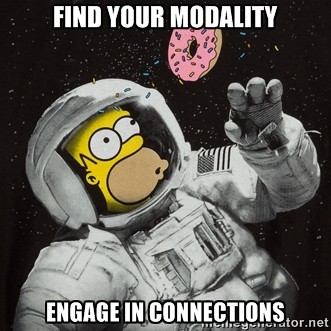This is interesting … a conversation criss-crossing Twitter and Blogs about writing and composing … it reminds me of a conversation that Anna Smith and I conducted a few years back after we both participated in Digital Writing Month … but now it is with Yin Wah.
.@dogtrax response to your blogpost “Which modality” http://t.co/YkvaTqkvdA #blogging about #findingourvoice #vcualtlab
— Yin Wah Kreher (@yinbk) June 10, 2015
I am reading her latest post right now. You read it, too. As a backtrack to the story here, this all began with her asking me on Twitter about which modality I most enjoy writing in, and I responded with a blog post about songwriting, and she responded to that post with her own post, alerting me on Twitter.
We’re zigzagging here in an interesting way … You are invited to join the conversation, or just peep in … We’re having a public conversation in a very connected way.
Dear Yin Wah,
Thank you for responding to my post with a post of your own. (Oh, by the way, I teach sixth grade, not music. I’d love to be a music teacher, though. My two favorite teachers when I was a kid were my elementary and high school music teachers. I don’t know what happened in middle school but he did not have much of an impact on me, apparentely) I appreciated your writing about your own views on creativity and composition, and the ways you struggle with the various modalities. Me, too. All of us, right?
You wrote:
Powerful emotions move me a lot to write some (crappy) poetry sometimes, mostly prose. I used to want to write a play and stage it. I like singing too, but haven’t sung in a choir since I arrived in America. Theatre moves me powerfully. I paint sometimes, not enough. I doodle, not enough. I take photos, and sometimes, I can say I feel that the image is almost incredibly perfect at conveying a mood.
You also wonder:
One question you didn’t answer is a related one. In daily life, you aren’t and can’t be composing songs to sort out ideas, right? So do you think often in words without music in everyday life? Or words often appear somehow with music? Or does a tune often go on in your head?
What an interestingly-phrased question you have there, Yin Wah: So do you think in words without music in everyday life? Yes, of course, words are always pushing inside my head.
Most days, it is lesson plans and the ways I am going to engage my students in writing. How will I explain this? How will I reach that particular student? Or it is the family stuff — who is going to drive which kid where and how in the world will we get there on time, and who is making dinner …
But when I am in the midst of writing a song, or a poem, what I find is that the rhythm and melody becomes this force — silent to others but loud as heck to me — that I am unable to shake. It’s as of the piece of writing has taken on a life of its own and is forcing its way out. I have to listen to it. Maybe that is the “losing yourself” flow that you wondered about, too. It’s the demands of the writing itself on the writer. In my head, I tinker with words choices, with inflection points, with how this would sound with that and what if we added this here and that over there. I could be talking to you, in this moment, and still writing that song or poem in my head.
I realize, in writing that, that I sound like a crazy man, hearing voices and words. I suspect this is where one modality (the explanation in writing of the process of writing) fails the other (the writing of music or even poetry from the artistic sense), or perhaps it is my own limitations as a writer to fully explain how completely immersive the experience becomes.
Years ago, when I was a journalist for a regional newspaper, I used to take my breaks by walking the neighborhoods around the office, using the rhythm of the walk to write lyrics in my head. I’d sing silently to myself, trying out words and phrases. I’d quicken or slow down my pace. The sidewalks became the drum machine. Over and over and over again, I’d work it out, until the song was embedded in my brain. I would never bring a notebook. Then, I would rush back to the office and quickly try to write it all out (and if you see my handwriting from the other post, you know this is a tricky endeavor … my hand does not keep up with my mind … perhaps this is another post another day ….)
You talk about taking photographs, Yin Wah, and you wrote, “I take photos, and sometimes, I can say I feel that the image is almost incredibly perfect at conveying a mood.”
I wonder, Yin Wah, how do you know when you have reached that point of thinking, this is the image I had in mind? What is your process like when using image to convey meaning? How do lenses and filters and other technology either help or hinder that creative process?
I look forward to your responses. Thank you for taking the time to engage in this discussion with me.
Peace (from here to there, and everywhere),
Kevin
